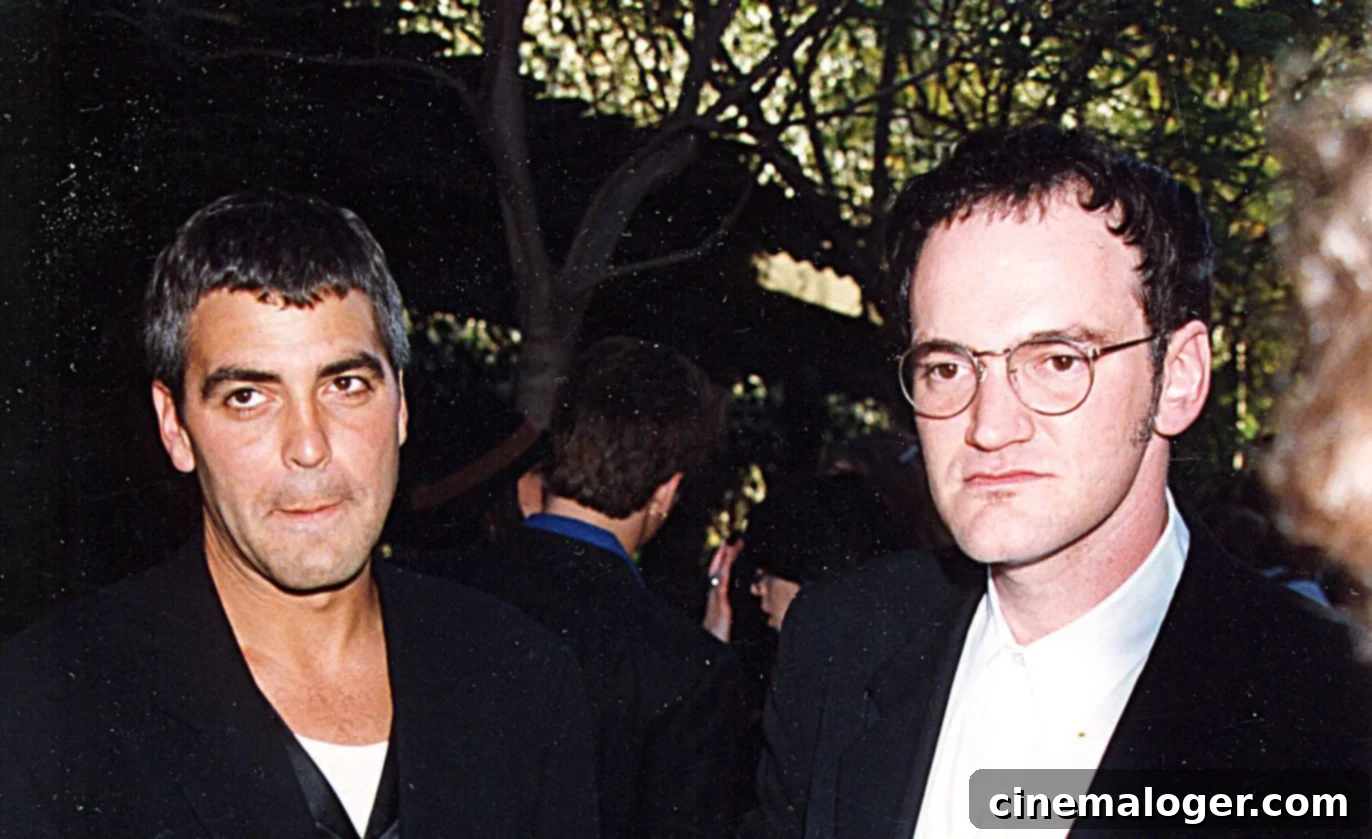George Clooney Fires Back at Quentin Tarantino’s “Not a Movie Star” Jibe: A Deep Dive into Hollywood’s Star Power Debate
Hollywood veteran George Clooney recently made headlines with a characteristically candid response to filmmaker Quentin Tarantino. During a joint interview with Brad Pitt, Clooney didn’t hold back, directly addressing a comment Tarantino allegedly made that questioned Clooney’s status as a “movie star.” The exchange has ignited discussions about celebrity status, the evolution of the film industry, and the sometimes-blunt opinions that shape Tinseltown’s narrative.
The Spark: Tarantino’s “Not a Movie Star” Jab
The controversy first surfaced during a revealing interview for GQ, where George Clooney, the 63-year-old star of blockbusters like Ocean’s Eleven, minced no words about his irritation with Quentin Tarantino. Clooney recounted an incident where the acclaimed 61-year-old director, known for his distinctive cinematic style and often provocative statements, reportedly dismissed Clooney’s star power. “Quentin said some s**t about me recently, so I’m a little irritated by him,” Clooney openly shared with GQ during a cover story featuring his longtime friend and co-star, Brad Pitt, published on Tuesday, August 13.
Clooney elaborated on the specifics of Tarantino’s alleged slight: “He did some interview where he was naming movie stars, and he was talking about [Brad] and somebody else, and then this [interviewer] goes, ‘Well, what about George?’ He goes, ‘He’s not a movie star.’” The comment struck a nerve with Clooney, particularly when Tarantino further challenged him to “Name me a movie since the millennium” in which he considered Clooney a star. Clooney’s immediate and very public retort was unequivocal: “And I was like, ‘Since the millennium‘? That’s kind of my whole f**king career. So now, I’m like, all right, dude, f**k off. I don’t mind giving him s**t. He gave me s**t.” This sharp exchange quickly captured attention, highlighting the fierce pride and competitive spirit that can still run deep among Hollywood’s elite.
Redefining Stardom: Clooney’s Post-Millennium Career
George Clooney’s exasperation with Tarantino’s “since the millennium” challenge is entirely understandable, given the trajectory of his career. Indeed, the vast majority of Clooney’s most iconic and commercially successful roles, which cemented his status as a leading man and an Oscar-winning actor and filmmaker, have come after the year 2000. Following his breakout role on the TV series ER in the 1990s, Clooney transitioned into film stardom with remarkable success in the new millennium.
His post-2000 filmography boasts an impressive array of hits and critically acclaimed performances. This includes the highly popular Ocean’s Eleven franchise (2001, 2004, 2007), which undeniably showcased his charisma and box office appeal alongside fellow stars like Brad Pitt and Matt Damon. Beyond commercial successes, Clooney earned critical acclaim and an Academy Award for Best Supporting Actor for his role in the 2005 geopolitical thriller Syriana. He continued to deliver powerful performances in films such as Michael Clayton (2007), Up in the Air (2009), The Descendants (2011), and the visually stunning sci-fi epic Gravity (2013), all of which garnered significant awards buzz and solidified his reputation as both a serious actor and a bankable star. He also received an Oscar for Best Picture as a producer for Argo (2012). These films, spanning various genres and demonstrating both his acting prowess and drawing power, collectively make a compelling argument against any assertion that his stardom waned or was non-existent in the post-millennium era.
Tarantino, known for his often unconventional and provocative takes on cinema history, might have a specific, perhaps nostalgic, definition of what constitutes a “movie star.” However, in a constantly evolving industry, the concept of stardom has broadened to include not just box office pull but also critical acclaim, cultural impact, and the ability to helm successful projects both in front of and behind the camera. Clooney’s diverse contributions as an actor, director, and producer unquestionably place him firmly within the ranks of Hollywood’s most influential and enduring figures, easily countering any narrow or dated interpretation of “movie star” status.
A Legacy of Collaboration: From Dusk Till Dawn and Beyond
The irony of Quentin Tarantino’s comment is particularly poignant given his own professional history with George Clooney. The two collaborated on the cult classic 1996 horror-action film From Dusk Till Dawn, where they not only co-starred but Tarantino also wrote the screenplay. In the film, Clooney played the smooth-talking criminal Seth Gecko, while Tarantino took on the role of his volatile brother, Richie Gecko. Their on-screen chemistry, albeit brief and intense, became a memorable part of the film’s enduring appeal, contributing significantly to its cult status.
Despite this successful early collaboration, Clooney and Tarantino have not worked together on a project since. This long hiatus in their professional relationship makes the recent “not a movie star” comment even more intriguing. It’s unclear whether Tarantino’s alleged statement is a genuine critical assessment, a playful but cutting jab, or perhaps a reflection of some deeper, unspoken dynamic between the two industry titans. Whatever the motivation, the public spat highlights the complex relationships that can exist within the tightly knit world of Hollywood, where past collaborations don’t always guarantee future harmony, and frank opinions can occasionally lead to very public disagreements.

The Art of Filmmaking: Directors, Scripts, and Silver Screens
Beyond the direct response to Tarantino, George Clooney also used the GQ interview as an opportunity to share profound insights into the craft of filmmaking and the elements he believes are truly essential for success. While discussing his and Brad Pitt’s upcoming movie, Wolfs, Clooney emphasized the critical importance of a strong director and a compelling screenplay. He remarked that he and Pitt have been “really lucky” to have worked with “great directors,” underscoring his belief that “the director and screenplay is what keeps you alive” in this demanding industry.
Clooney further elaborated on this crucial lesson, stating, “And I learned that after doing some really bad films. You can’t make a good film out of a bad script. You can’t do it. You can make a bad film out of a good script.” This adage, widely accepted among industry professionals, highlights the foundational role of the script as the blueprint for any film. A poorly written script, lacking coherent plot, compelling characters, or meaningful dialogue, presents an insurmountable obstacle, even for the most talented actors and directors. Conversely, a brilliant script can still be undermined by weak direction, poor casting, or a myriad of production missteps. Clooney’s pragmatic view underscores his commitment to quality storytelling and directorial vision, components he sees as far more vital for a film’s success and an actor’s longevity than any ephemeral definition of “movie star” status.
Hollywood’s Shifting Sands: Star Power in the Streaming Era
The conversation with Brad Pitt also delved into the broader landscape of Hollywood and how it has transformed since both actors began their careers. George Clooney offered a nuanced perspective on the decline of the traditional studio system and its impact on star development. “Well, they haven’t developed stars the way the studio system used to,” Clooney observed. He reflected on how he and Pitt “kind of were at the very end of that, where you could work at a studio and do three or four films, and there was some plan to it. And I don’t think that’s necessarily the case anymore. So it’s harder for you to sell somebody something on the back of a star.”
Historically, the studio system meticulously groomed actors into stars, building their personas and career paths through carefully selected projects. This structured approach, which yielded legendary figures in cinema, has largely dissolved in the modern era. Today’s fragmented media landscape, dominated by streaming services and a proliferation of content, means that actors often navigate a more independent and unpredictable career trajectory. While it might be harder to cultivate universal “movie stars” in the traditional sense, Clooney also noted the silver lining for aspiring actors. He claimed that nowadays, with “600 shows” on television and streaming platforms, “there’s a lot more work for actors.” This surge in production offers unprecedented opportunities for talent, albeit often shifting the focus from big-screen blockbusters to episodic storytelling. The challenge now lies in standing out amidst a vast sea of content and leveraging these varied platforms to build a sustainable and impactful career, redefining what “stardom” means for a new generation.
Beyond the Banter: A Look at the Industry’s Future
George Clooney’s candid remarks about Quentin Tarantino and the state of Hollywood offer more than just celebrity gossip; they provide a valuable snapshot of the industry’s ongoing evolution. The exchange between these two influential figures highlights the differing perspectives on what defines success and enduring impact in the entertainment world. While Tarantino might cling to a more classic, perhaps purist, definition of a “movie star,” Clooney’s career trajectory and his insightful commentary reflect a more adaptive and modern understanding of stardom, one that encompasses versatility, critical acclaim, and a keen understanding of the filmmaking process itself.
In an era where the lines between film and television are increasingly blurred, and audiences consume content across countless platforms, the debate over who qualifies as a “movie star” becomes less about traditional box office draw and more about consistent quality, cultural relevance, and the ability to tell compelling stories. Clooney’s robust career, particularly since the turn of the millennium, stands as a testament to his undeniable star power and enduring presence. This public spat, while entertaining, ultimately serves as a reminder that even Hollywood’s biggest names continue to grapple with changing definitions and the relentless march of industry transformation, all while occasionally engaging in a little playful, yet pointed, banter.
